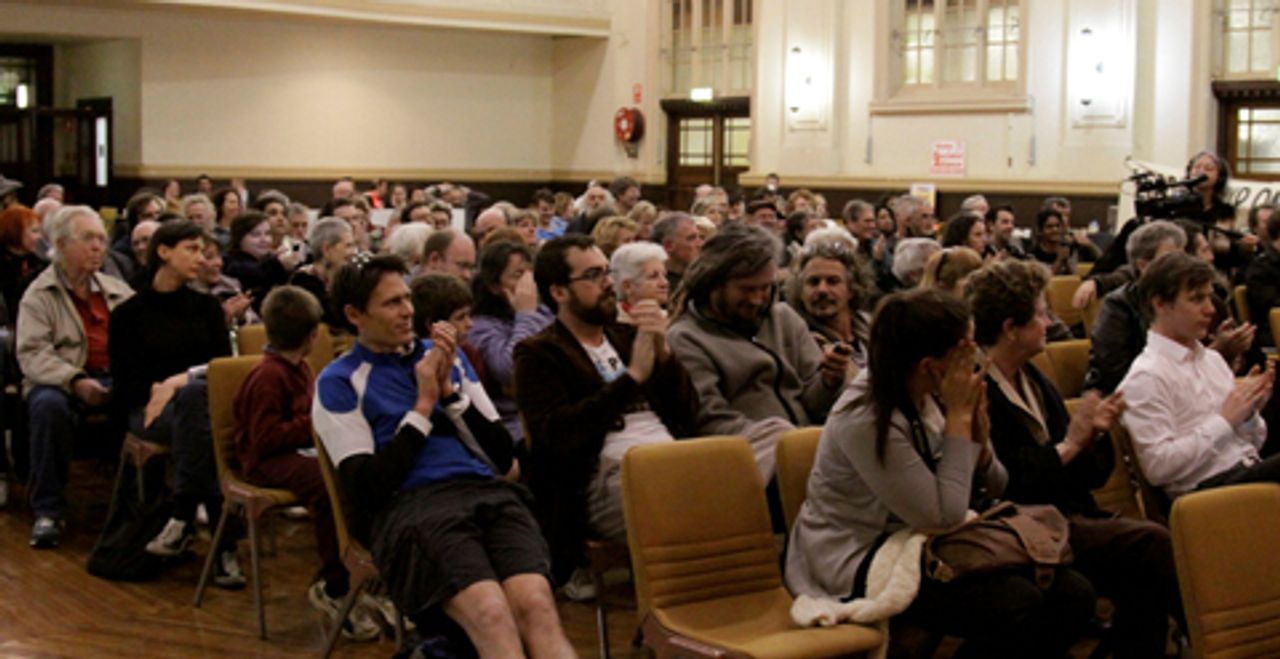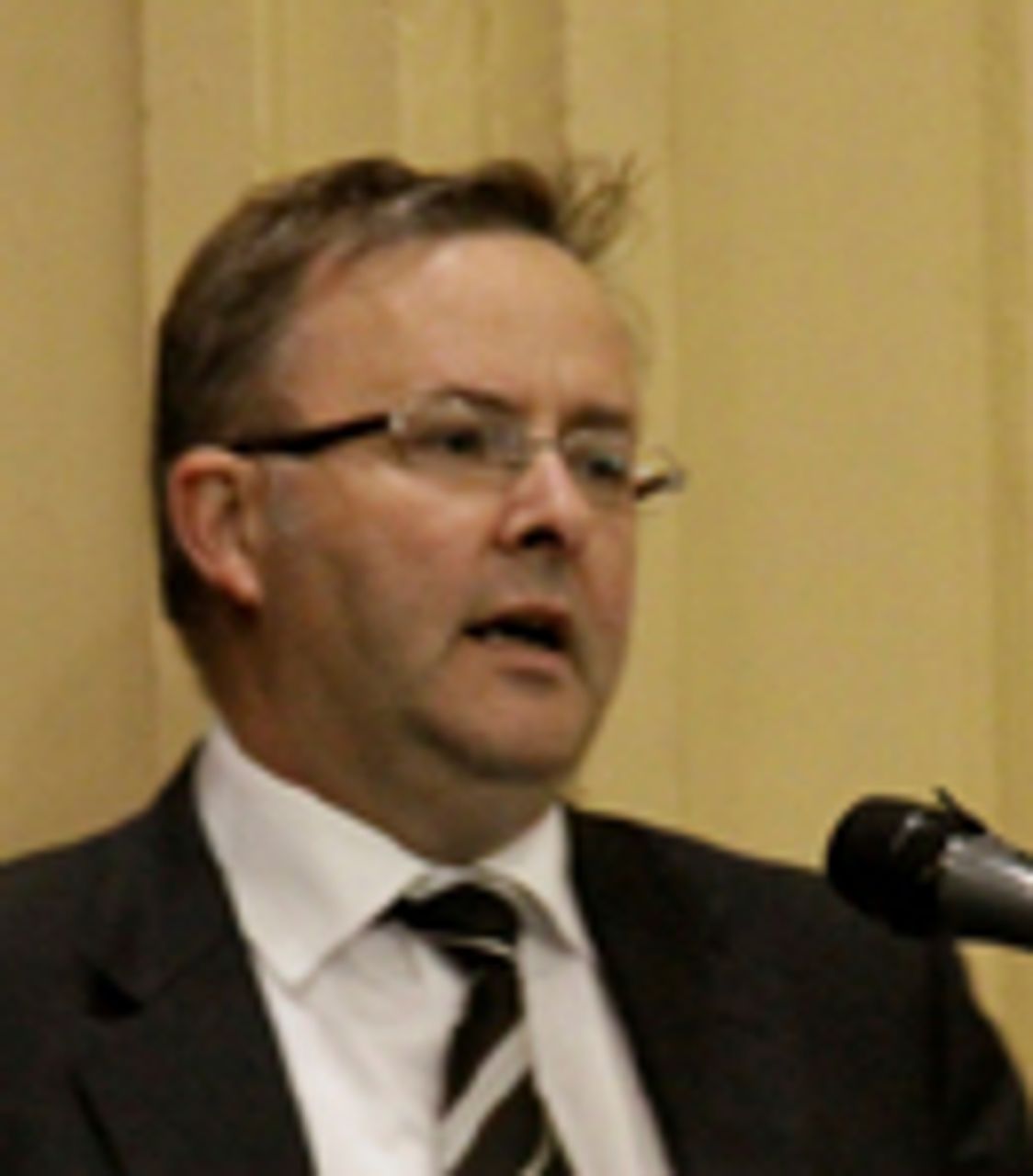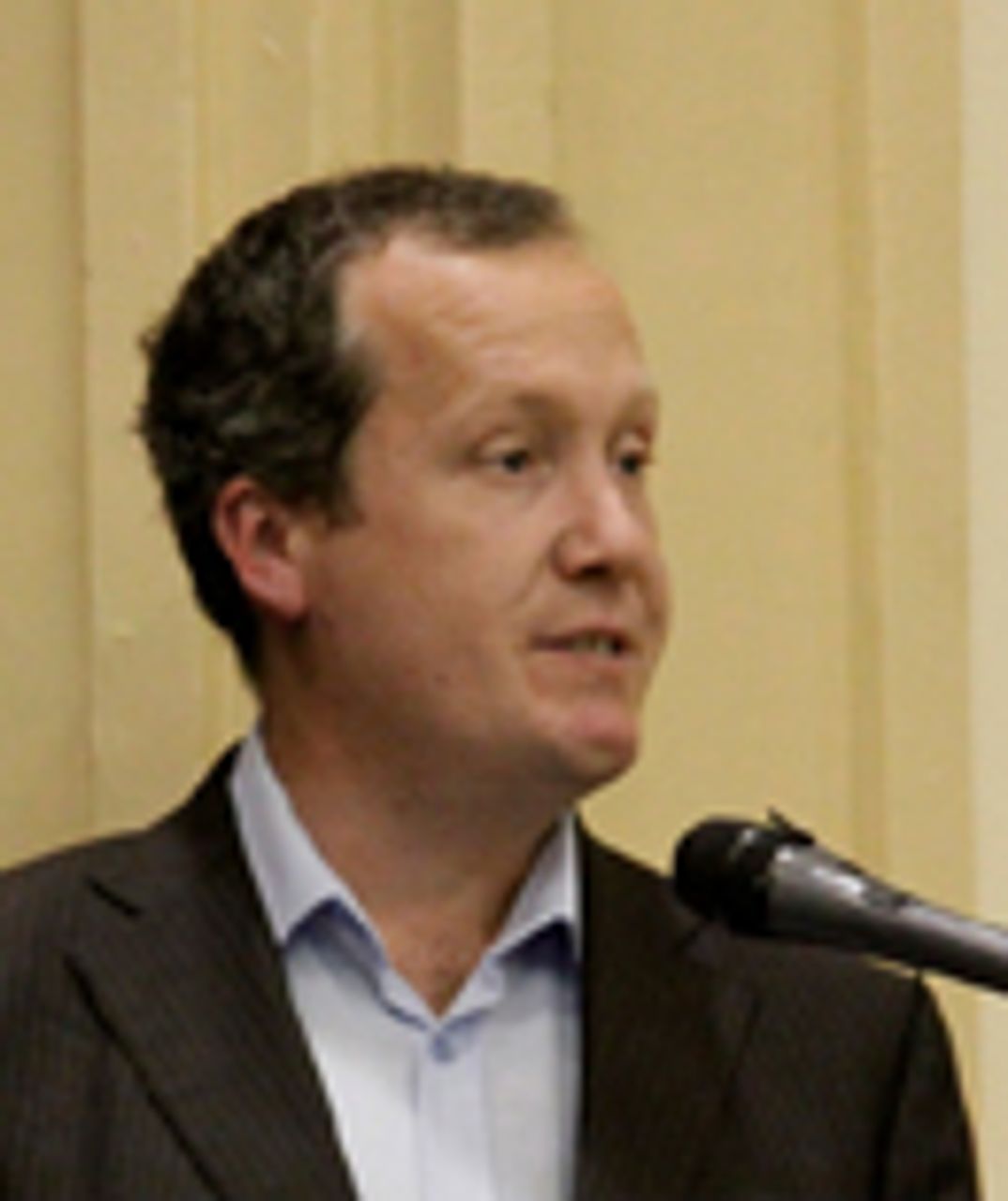James Cogan, the Socialist Equality Party candidate for Grayndler, in Sydney’s inner west, made the contrast between the SEP and every other party crystal clear at a candidates’ debate at Marrickville Town Hall last night. Five candidates—from the SEP, Labor, Greens, Democrats and Socialist Alliance—spoke at the forum, organised by the local newspaper, the Inner West Courier. About 200 people heard each candidate speak for five minutes and then asked questions of the panel for more than an hour.
 James Cogan
James CoganCogan began his opening remarks by explaining that the SEP “is the Australian section of the International Committee of the Fourth International, the world Trotskyist movement. It is the only party that represents the independent interests of the working class.” He continued: “This election takes place under conditions of the greatest global economic crisis since the Depression and two decades of military violence spearheaded by the United States. Hanging over it is the stench of the anti-democratic political coup carried out within the Labor Party. Kevin Rudd was ousted to refashion a far more right-wing Labor government that will implement, under Julia Gillard, the demands of the mining giants and financial markets for a shift from stimulus spending to austerity.”
The SEP candidate warned that Gillard had already nominated public health, education, aged care and social welfare for cost savings, and would escalate the Labor government’s involvement in the criminal US-led war in Afghanistan. He added that the trade unions had collaborated with the government in reducing a third of the workforce to casual or part-time work thus hiding the real level of unemployment, cutting real wages and imposing Labor’s Fair Work laws, which made it virtually illegal to take industrial action.
Cogan urged the audience to draw the necessary political lessons from these bitter experiences. “When you consider your vote, remember that at the last election the unions, the Greens and Socialist Alliance claimed that Labor was a ‘lesser evil’ to the Liberals. They threw dust in your eyes. As only the SEP warned in 2007, Labor is not a lesser evil, it is the direct representative of big business interests. The working class needs a new political leadership and a new perspective. Nothing will be resolved through parliament. Instead, the SEP is advancing a socialist solution to the bankrupt profit system and a workers’ government.”
 A section of the Grayndler audience
A section of the Grayndler audienceOne heckler’s attempt to interrupt Cogan fell flat. There was applause as Cogan pointed out that climate change could not be prevented, as Labor and the Greens claimed, through the same free market and nation-state system that had created the environmental crisis. Cogan then turned to the issue of war. He said that both the Greens and Socialist Alliance had supported Australia’s military operations in the Asia-Pacific region, where the US and Australia faced the growing influence of rivals, especially China. “The SEP stands for the immediate and unconditional withdrawal of all Australian police and military personnel and other foreign forces from Iraq, Afghanistan, East Timor, and the countries of the South Pacific,” he said to applause. “We fight for the mobilisation of the international working class against militarism, colonialism and war.”
Cogan concluded: “Against the hysteria being whipped up against refugees and immigrants, the SEP fights for the unity of the international working class, and insists on the right of all people to live in whatever country they choose, with no restrictions and with full citizenship rights. I urge you to take a principled political stand for genuine socialism and vote for the Socialist Equality Party in Grayndler and for the Senate.”
 Anthony Albanese
Anthony AlbaneseBy contrast, Labor’s candidate, Infrastructure and Transport Minister Anthony Albanese, argued that there was only one “simple choice” in the election: between Gillard and Liberal leader Tony Abbott. He boasted that he had “sat around the cabinet table of a Labor government,” but “you can’t do everything you want” and “we are always going to disappoint some people”.
The Greens candidate, Sam Byrne, claimed that the Greens were now “the only choice for progressive voters”. However, he emphasised that his party was hopeful that a Labor government would adopt more Green policies, such as a national fast rail project and the scrapping of a local freeway extension. His remarks underscored the Greens’ actual perspective: to form a de facto coalition with Labor nationally, as they have already done in the state of Tasmania.
The Socialist Alliance’s Pip Hinman contended that “people’s power,” social justice and “direct democracy” were possible under the current socio-economic order. Hinman criticised the conflicts of the major parties over climate change and said her party instead sought to “bring people together,” against “selfishness, greed and narrow sightedness”. In line with the protest perspective of Socialist Alliance, she implied that corporate interests could be subjected to mass pressure. Hinman claimed that it was possible to resolve the climate crisis with currently available technologies, because it would cost just 3 percent of GDP.
During question time, Albanese faced a barrage of objections as he blatantly evaded questions about the government’s opposition to replacing Sydney’s nearby international airport—which subjects residents to constant aircraft noise—and Labor’s refusal to scrap the previous Howard government’s education funding formula, which pours hundreds of millions of dollars into wealthy private schools.
Cogan explained that capitalism was incapable of rationally planning air transport because of the corporate interests involved, including those of Macquarie Bank, which owns the privatised Sydney airport. The SEP candidate also warned that the Labor government was accelerating the assault on public education. Gillard’s program of NAPLAN testing, her My School web site and “performance bonuses” for principals and teachers who produce good test results, would lead to the closure of supposedly “failed” schools. Cogan emphasised that the teachers’ unions had blocked the opposition of teachers to this offensive. New organisations had to be formed to organise a rebellion against the government’s plans.
On both these questions, Hinman followed Cogan, and sought to smother the political and class issues he had raised. While compelled to state some agreement with the SEP candidate’s positions, she effectively made an appeal to Labor and Greens to accept the Socialist Alliance as a contributor to their policies. She said there was no reason why a “wealthy country” like Australia could not afford better airport planning and education. She made no mention of the working class, let alone socialism, in any of her remarks.
 Sam Byrne
Sam ByrneThe Greens’ calculations of forming a de facto coalition with Labor were further exposed when a questioner called for the abolition of the preferential voting system, which compels voters to cast preferences for parties they oppose. Sam Byrne insisted that he opposed “secret preference deals” and favoured reforms to make the electoral system “more transparent”. Transport minister Albanese then pointed out that he had helped negotiate a backroom deal with the Greens for the two parties to swap preferences in many seats. Albanese commented that the Greens were “just another party” seeking office, like Labor and the Liberals.
Cogan said Albanese’s remarks were revealing. He explained that, for all their progressive pretensions, the Greens were seeking to secure the re-election of the Labor government, just as they had done in Tasmania, where they now held two cabinet posts. Cogan warned that the Greens would collaborate in cutting social spending, as they did during their last accord with a Labor government in Tasmania, between 1989 and 1992.
A local peace group member asked why there had been virtually no mention of the Afghanistan war during the election campaign, despite opinion polls showing 61 percent opposition to it. Cogan answered first, pointing out that the Labor government had remained silent on Liberal leader Abbott’s support for sending more troops to Afghanistan. He explained that the war had nothing to do with combating terrorism or liberating the women of Afghanistan, but was driven by the immense oil, gas and strategic interests at stake in the Central Asian and Middle Eastern regions. The SEP candidate said the Australian-based mining giants, BHP Billiton and Rio Tinto, were lining up for multi-billion contracts in the area, and the Australian ruling elite also regarded the war as essential for the US military alliance.
Albanese openly sought to justify the war, insisting that it was a UN-sanctioned operation as part of the “war on terror”. He likened the fight against the Taliban to the war against fascism during World War II. This analogy not only denied the real nature of the last world war, which was a conflict between US, British, German and Japanese imperialism, but implied that more troops should be sent to seek “victory” in Afghanistan.
Both the Greens and Socialist Alliance candidates claimed to oppose the war, but they did so only from a nationalist standpoint. Hinman said it was a war that “Australia should not be in” because the troops had been sent to “support the US war alliance”. Byrne called for a withdrawal to “bring the troops home”. Far from opposing the deployment of the armed forces elsewhere overseas, he advocated parliamentary debates to sanction such deployments—a proposal that seeks to give a veneer of legitimacy to the use of troops.
After the debate, numbers of members of the audience approached Cogan to thank him for his contribution, and especially for highlighting the war in Afghanistan and explaining the driving forces behind it.
Click here for full coverage of the SEP 2010 election campaign
Authorised by N. Beams, 307 Macquarie St, Liverpool, NSW 2170
